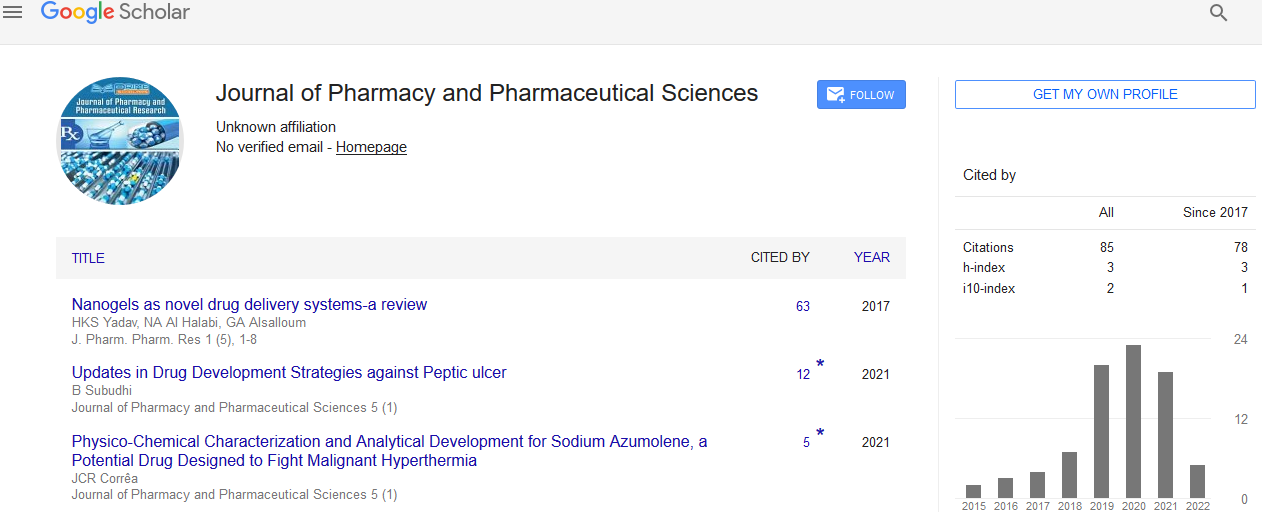Commentary Article - (2022) Volume 6, Issue 2
Synthetic Drugs and its Effects in Biological Systems.
Alen Zhu*
Department of Pharmacy, University of Peking, China
*Correspondence:
Alen Zhu, Department of Pharmacy, University of Peking,
China,
Email:
Received: 29-Mar-2022, Manuscript No. IPIPR- 22-13395;
Editor assigned: 31-Mar-2022, Pre QC No. IPIPR- 22-13395(QC);
Reviewed: 14-Apr-2022, QC No. IPIPR- 22-13395;
Revised: 19-Apr-2022, Manuscript No. IPIPR- 22-13395(R);
, DOI: 10.21767/ipipr.6.2.06
Description
Pharmacology is a branch of medicine, biology and pharmacology
related to the action of drugs or drugs, in which a drug
can be defined as any synthetic, natural, or endogenous molecule
(from within the body) that has a biochemical or biological
effect on a cell, tissue, organ. , or body (sometimes the word
pharmacon is used as a term to combine these types of bioactive
endogenous and exogenous). In particular, it is the study
of the interactions that occur between living organisms and
chemicals that affect normal or abnormal biochemical activity.
If the substances have medicinal properties, they are considered
medicinal. The field covers drug formulation and properties,
drug formulation and formulation, cell and cell pathways,
organ / systems processes, signal transmission / cellular communication,
cell diagnostics, interactions, chemical biology,
treatment, and medical applications and antipathogenic powers.
Pharmacodynamics examines the effects of drugs on biological
systems, and pharmacokinetics studies the effects of
biological systems on drugs. Typically, pharmacokinetics deals
with chemicals and biological receptors, while pharmacokinetics
deals with the absorption, distribution, metabolism and
release of chemicals from biological systems. Pharmacology is
not the same as pharmacy and the two terms are often confused.
Pharmacology, a biomedical science, is involved in the
research, detection, and classification of chemicals that show
biological effects, as well as the specification of cellular and
biological functions associated with those chemicals. In contrast,
pharmacists, like medical professionals, are interested in
applying the principles learned in the pharmacy in their clinical
setting. Whether it is the role of pharmacy or clinical care.
In any field, the main differences between the two are their
differences between direct patient care, the performance of
the pharmacy, and the field of scientific research, conducted
by medical science. Pharmacology can focus on specific processes
involving the body. Phase related body systems study
the effects of drugs on different body systems. Psychopharmacology is the study of the use of drugs that affect the mind,
mind and behaviour (eg antidepressants) in the treatment of
mental disorders (e.g. depression). It incorporates methods
and techniques from neuropharmacology, animal behavior and
behavioral neuroscience, and has an interest in behavioural
and neurobiological action of psychoactive drugs. Pharmacemetabolomics,
also known as pharmacemetabonomics, is a field
from metabolomics, measurement and analysis of metabolites
produced by the body. It refers to the precise measurement of
metabolites in human body fluids, in order to predict or test genetic
mutations, as well as to better understand the pharmacokinetic
profile of a drug. Pharmacemetabolomics can be used
to measure metabolite levels following drug administration, to
monitor drug effects on metabolic pathways.
Conclusion
Pharmacomicrobionics examines the effects of changes in
small flowering plants, effects and effects of drugs. Pharmacodynamics
examines the effects of drugs on biological systems,
and pharmacokinetics studies the effects of biological systems
on drugs. Typically, pharmacokinetics deals with chemicals
and biological receptors, while pharmacokinetics deals with
the absorption, distribution, metabolism and release (ADME)
of chemicals from biological systems. Pharmacology is not the
same as pharmacy and the two terms are often confused.
Acknowledgement
The author is grateful to the journal editor and the anonymous
reviewers for their helpful comments and suggestions.
Conflict of Interest
The author declared no potential conflicts of interest for the
research, authorship, and/or publication of this article.
Citation: Alen Zhu (2022) Synthetic Drugs and its Effects in Biological Systems. J Pharm Pharm Res Vol.6 No.2:06
Copyright: © Alen Zhu. This is an open-access article distributed under the terms of the Creative Commons Attribution License,
which permits unrestricted use, distribution, and reproduction in any medium, provided the original author and source are
credited

